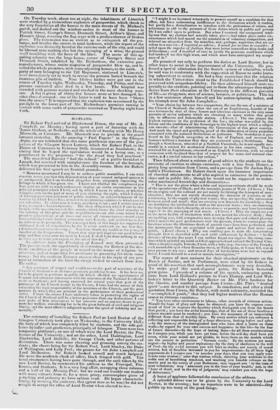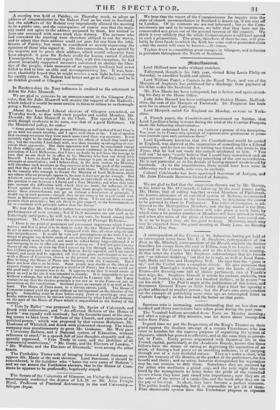The ceremony of installing Sir Ilabert Peel as Lord Rector
of the Glasgow University took place on Wednesday, in the University [lull; the body of which was completely tilled by students, and the side gal- leries by ladies and gentlemen, principally of Glasgow. There were two temporary platforms ; on one of which were the Lord Rector, the Pro. fessors of the University ; and on the other, Lord Haddington, Lord Hardwicke, Lord Melville, Sir George Clerk, and other persons of distinction. There was some cheering and groaning among the sta. dents ; the cheers being for Sir Robert Peel, Lord Stanley, the Duke of Wellington, and Lady Peel ; the groans for Sir John Campbell and Lord Itlelbourne. Sir Robert looked unwell and much fatigued. lie wore the academic cloak of office, black fringed with gold. The usual ceremottics having been gone through, and the oath taken by the new Lord Rector, he commenced his address to the Principal, Pro- fessors, and Students. It is a very long affair, occupying three columns and a half of the Morning Post ; but we need not to ouble our readers with many extracts from it, for a more prosy, commonplace piece of reaching mid pedantry we have seldom read. Ile began characteris- tically, by assuritg the audience, that (great Mall as lie was) he did nut scruple to accept the office of Lord Rector when elected to it- " I might it we hesitated voluntarily to present myself we a candidate for that office, not from unbecoming indifference to the distinction which it confers, hot partly holt disinclination to interfere ivith the pretensions of others, and tcluctance to add to the pressure of those duties which in public and private life I am callea upon to perform. But when I received the unexpected intel- ligence that my election had actually taken platio—had taken place under eir- cunistances which, haul spared me the painfulness of voluutary competition, and relieved me altogether from the anxieties, and, perhaps, asperities, that are in- cident to a con,est-. I reguired.no advice ; I asked for no time to consider ; I acted upon the impulse to,' feelings that were better counsellors thou doubt and deliberation; and I resolved at once to justify the generous confidence which hail tendered me this high trust, and which must have anticipated my accept- ance of it."
He promised not only to perform his duties as Lord Rector, but in other ways to assist in the improvement of the University. Ile pro- fessed a special admiration for the Scotch system of education, which he said was in conformity with the suggestion of Bacon to make learn- ing subservient to action. He had a firm conviction that the relation in which the Universities stood to the Established Church should be preserved with scrupulous fidelity. Ile then addressed himself more es- pecially to the students, pointing out to them the advantages they might derive from their education at the University in the different pursuits of life—as clergymen, men of science, lawyers, or politicians. This let in a few sentences about himself and his cotton-spitining father, and his triumph over Sir John Campbell- " Your choice lay between two competitors, the one the son of a minister of the Church of Scotland, the other the son of an Englishman, founder of his CM ue fortunes by dint of those honest and laborious exertions in the very same pursuits of active industry which are elevating so many within this great city to affluence and honourable station. ( Cheers.) The oue attains the highest eminence in the profession of the law ; the other was called by the favour and the confidence of his Sovereign to the highest trust which a subject can execute—that of administering the Government of this great country. And mark the signal and gratifying proof of the obliteration of every prejudice connected with the national distinctions or jealousies. The Scotchman is pre- ferred to his English competitor at the bar of England, and receives his honoto s without a mutmur that they are conferred upon a Scotchman. But though a Scotchman, educated at a Scottish University, he is not equally suc- cessful in a contest for academical distinction in his own country. That is reserved for WI Englishman, educated at an English l'iliversity, with no other connexion with Scotland than that of respect tor her name and national cha-
meter, at d a cordial interest in her welfare. ' - Then followed about a column of good advice to the ittudents on the necessity of exertion to obtain eminence, with a line from Homer, pretty long quotation from Cicero, and a passage from Sir Joshua Rey- nolds's Discourses. Sir Robert dwelt upon the immense importance of classical attainments to all who aspired to eminence in the profes- sions and in public life ; though be would not be supposed to under- value mechanical knowledge and discoveries.—
" This is not the place where a fahse and injurious estimate should be made of the speculations et Black, and the inventive genius of Watt. ( Cheers.) The steam-engine and the railroad are not merely facilitating the transport of mer- chandise ; they are not merely shortening the duration of jimmies, or ad- ministerieg to the supply of physical wants; they are speeding the intercourse between mind mid mind ; they ate creating new demands tor knowledge; they are fertilizitig the intellectual as well as the material waste ; they are removing the impedinionts w liWI1 obscurity, or remotene,s, or poverty, may have heretofore impost ,1 to the emerging of real met it. ( Cheers.) They are supplying you in the mete facility of locomotion with a new motive for classical study ; they are enabling you, oith comparative ease, to enjoy that pure and lefined pleasure which makes the past predominate over the present, when we contemplate the localities where the illustrious deeds of ancient times have been performed, and the monuments that are associated with names and actions that never can perish. (Loud cheers.) They are enabling you hi tusk the intoxicating draught that is described with such noble enthusiasm by Gibbon : At the distance of twenty-five years I can neither forget nor express the strong emo- tions which agitated tny mind as I fit st approached and entered the Eternal City. After n sleepless night, I strode, I trod, with a lofty step, the ruins of the Forum; each memorable spot where Romulus stood, or Tully spoke, or Ciesar fell, was at once :present to my eye ; and several days of iutoxication were lost or enjoyed befia e I could descend to a cool or minute investigation.'" The names of men eminent for their classical attainments on the Belicht of Justice, and in Parliatnent, were cited by Sir Robert in proof of his assertion that such accomplishments were very desirable. To make good this much-disputed point, Sir Robert bestowed •
great pains. Upwittds of a column of his speech, embracing quota- tions from Lord llolland's preface to Fox's History, and Lord Wel-
lesley's letter to the Quarterly Review on Mr. Pitt's fondness for the classics, and another pessage from Cicero--Mr. Pitt's " kindred spirit "—are devoted to this subject. In conclusion, and after 11 third
quotation from Cicero, Sir Robert, with much solemnity, reminded the " accomplished youth," that they laid higher motives than the Roman orator to virtuous exertion- " You have other excitements to labour, other reward, of virtuous action. Should the hope of glory and fume be obscured, you have the express com- mand of God to improve the faculties which distinguish you from the beasts that perish ; you have the awful knowledge, that of the use of those faculties a solemn account must be rendered ; you have the assurance of an immortality
different from that of worldly fame. By every tnotive which can influence a reflecting and responsible being of a large discourse, looking before and after —by the memory of the distinguished men who have shed a lustre on these
walls—by regard for your own success and happiness in this life—by the fear
of future discredit—by the hope of lasting fame—by all these considerations do I conjure you, while you have yet time, before the evil day shall have yet
come, while your minds are yet pliable, to form them on the models which are the nearest to perfection. curda.' By the motives yet more urgent—by higher and purer aspirations—by the duty of obedience to the will of God—by the awful uccount you will have to render, not merely of moral
actions, but of faculties intrusted to you for improvement—by all these high arguments do I conjure you to number your days, that you may apply your hearts unto wisdom ;' unto that wisdom which, directing your ambition to the noble end of benelitting mankind, and teaching you humble reliance on the merits and out the mercy of your Redeeiner, may support you ' in the time of
your tribulation,' may • admonish you in the time of your wealth,' and, in the • hour of death and in the day of yudgmeut,' may comfort you with the hope of deliverance."
A burst of applause followed the conclusion of the address.
A splendid diluter was to be given by the University to the Lord
Rector, in the ev g; but no reporters were to be admitted—they gobble up too many a the good things. A meeting was held at Paisley, on Thursday week, to adopt an address of congratulation to Sir Robert Peel on his visit to Scotland; but the admerers of Sir Robert very imprudently allowed the meeting to be a public one, and the consequence of course was that the majo- rity could not agree to the address proposed by them, but wished to have one seasoned with more truth than flattery. The persons who had convoked the meeting were therefore obliged to sue for mercy, and to admit that their address could not pass for one from the inha- bitants of Paisley, but must be considered as merely expressing the opinions of those who signed it. On this concession, it was agreed by the majority not to press their address, which would otherwise have been adopted : it gave Sir Robert credit for having carried Catholic Emancipation, but expressed regret that, with this exception, he had almost invariably supported measures calculated to abridge the liber- ties of the people, while measures of an opposite tendency bad never failed to find in him an able and uncompromising foe. It was, how- ever, charitably hoped that he might receive a new light before closing his earthly career. Sir Robert had better not go to Paisley ; and he is on ticklish ground at Glasgow.



























 Previous page
Previous page